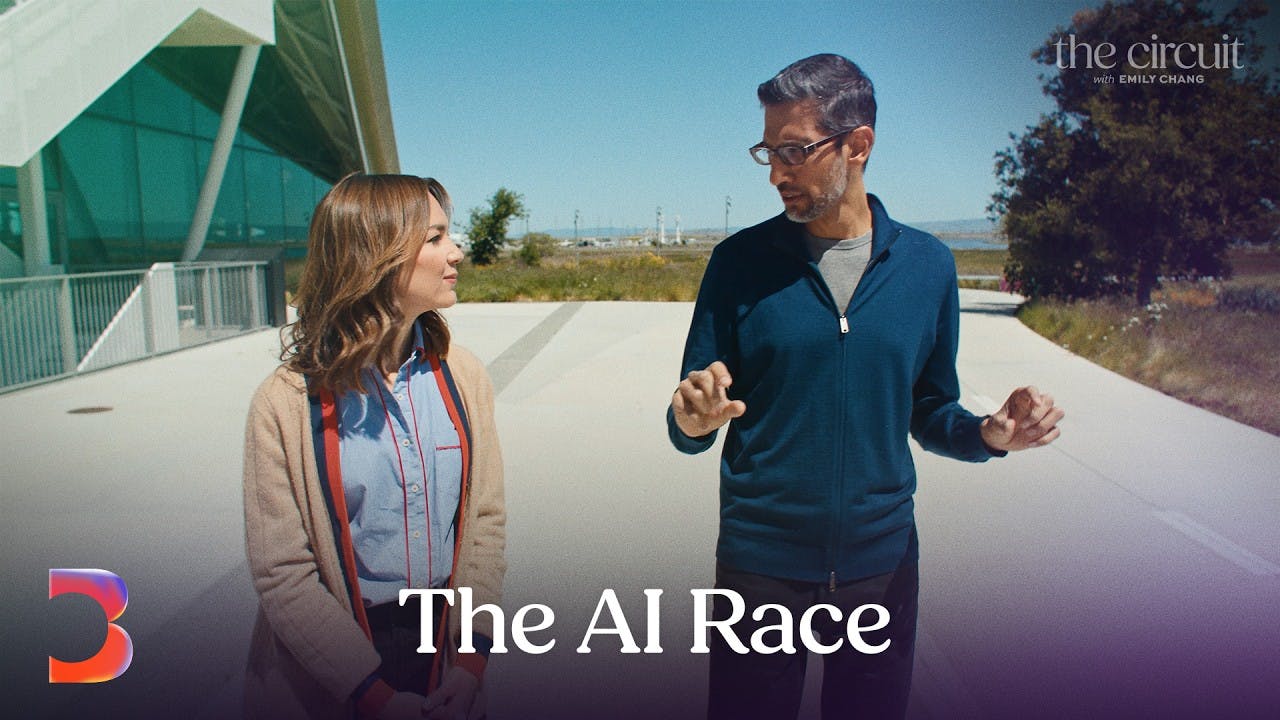Google CEO Sundar Pichai and the Future of AI | The Circuit
()

Sundar Pichai's Leadership and Perspective on AI
- Sundar Pichai, CEO of Google and Alphabet, emphasizes the importance of integrating AI into every aspect of Google's business.
- Despite the hype surrounding AI, Pichai believes Google is well-prepared for its long-term impact and sees it as the beginning of a transformative decade.
- Pichai personally uses AI tools like Google Lens and emphasizes the importance of learning and knowledge, aligning with Google's mission.
- As CEO for a decade, Pichai has developed a better understanding of patterns and the ability to separate important signals from noise.
- Former Google founders, Larry and Sergey, are still involved and actively contribute to AI development, providing a broader perspective and helping Pichai step back and look at the bigger picture.
Google's AI Strategy and Challenges
- While Google's competitors are using technology invented by Google, Pichai believes Google has an opportunity to improve its products with generative AI and the Gemini series of models.
- Pichai acknowledges the potential drawbacks of AI, such as incorrect information, but emphasizes that Google Search will continue to provide links to a variety of sources and meet users' different needs.
- Pichai acknowledges concerns about the quality of search results due to SEO spam and the influx of new AI-generated content but sees it as a challenge that will define high-quality products.
- Pichai acknowledges concerns about AI-generated content potentially harming Google's search business but expresses confidence that fundamental principles of user choice and balance will hold true.
- He addresses criticisms of "woke AI" and over-application of certain filters, acknowledging mistakes and taking responsibility for them.
- Pichai emphasizes the ongoing journey of addressing AI-generated content challenges and the need for a clear notion of objectivity and reality in a world with increasing synthetic content.
- He highlights the risks of using AI-generated data to train models and the importance of assessing whether these models are creating new knowledge and developing reasoning capabilities.
Google's Response to Competition and Innovation
- Pichai reflects on Google's position in the AI landscape, acknowledging the rise of ChatGPT and Microsoft's advancements but expressing a long-term perspective and confidence in Google's AI investments.
- He describes his leadership style as cautious and focused on building consensus, emphasizing the importance of clear decision-making and bringing the company along.
- Pichai responds to criticisms and questions about his leadership, expressing a commitment to hearing feedback and acknowledging the opportunities ahead with AI integration across Google's products.
- He discusses the importance of innovation to avoid becoming obsolete in the rapidly changing technology landscape and highlights Google's preparations for the AI moment.
- Pichai provides insights into Google I/O as a platform to showcase the company's vision for AI transformation and its products.
- He clarifies Alphabet's current focus on investing in deep technology and computer science to solve problems for people, emphasizing the underlying bet across Google and Alphabet.
- Pichai acknowledges the need for big bets and failures in pursuing large-scale innovations and reflects on Google's unique culture of open debate, employee voice, and transparency.
Google's Approach to AI Safety and Regulation
- Pichai sees smartphones and glasses as the primary devices for AI innovation and highlights the need for global cooperation on AI safety, including engagement with China.
- He defines Artificial General Intelligence (AGI) as AI becoming capable across a wide range of economic activities and expresses Google's commitment to making progress towards AGI responsibly.
- Pichai acknowledges that some aspects of AI may remain in a "black box" but believes AI will provide more insights and visibility into complex systems.
- He stresses the importance of systems and regulations to balance innovation and trust in AI systems.
Sundar Pichai's Vision for the Future of Google
- Pichai identifies the biggest threat to Google's future as not executing well and emphasizes the need for a healthy dose of paranoia to stay competitive.
- He expresses hope that current advancements in AI, such as Large Language Models (LLMs), will appear basic and rudimentary in the future, indicating significant progress.